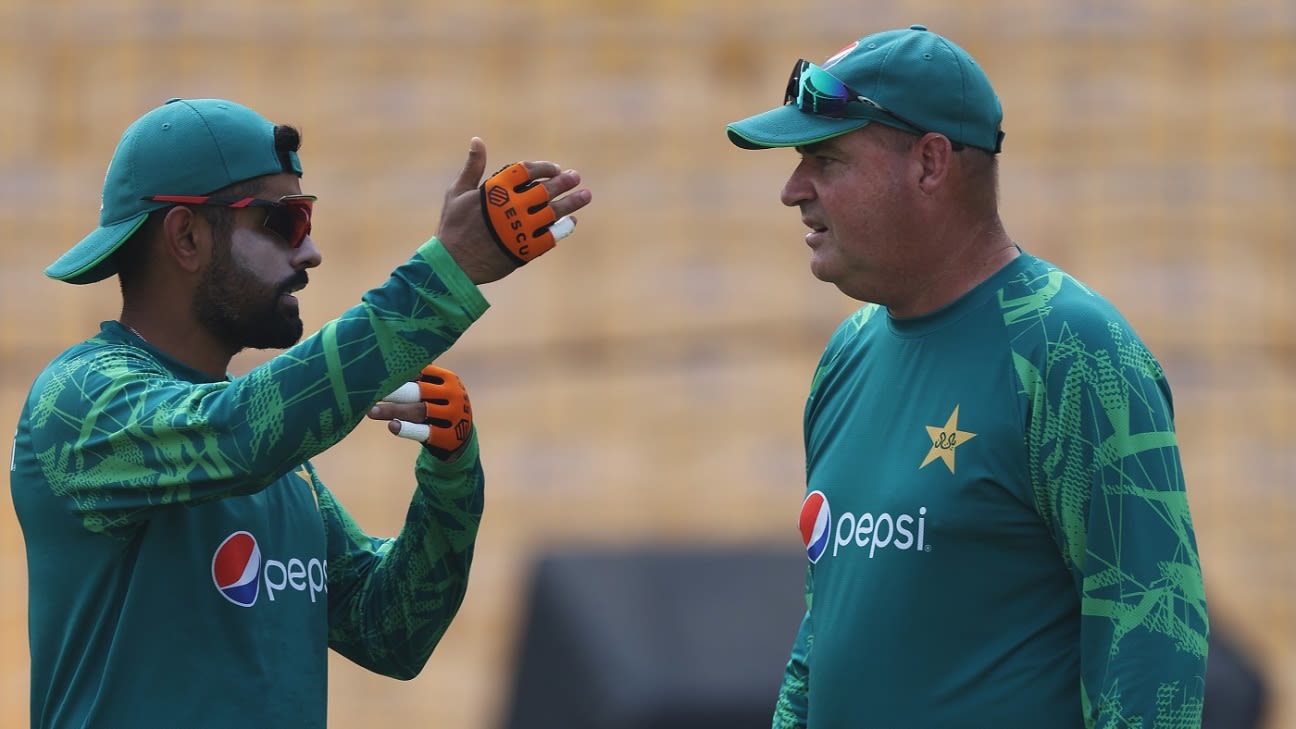Arthur backs captain Babar: ‘We have to allow him the time to grow’
Pakistan finished with five losses in nine matches and had struggled through the middle of the league stage, losing to India, Australia, Afghanistan, and South Africa all in a row. Babar’s own form wasn’t quite to expectation, given the extremely high standards he often sets in white-ball cricket. He averaged 40 and struck at 82.9, hitting five fifties and making a high score of 74.
As a result, Babar’s captaincy has come under significant scrutiny at home. He had been the top-ranked ODI batter, and Pakistan had been the top-ranked ODI side as recently as September. But poor campaigns in both the Asia Cup and World Cup have now changed the outlook on his leadership.
“I get behind Babar – he is very, very close to me,” Arthur said after the loss to England. “He’s a young guy that needs to be taken on the journey with. He needs to be shown the ropes. He’s still learning all the time. We know he’s a very, very fine batsman. He learns every day with his captaincy.”
Babar has had the ODI reins for over three years now, and at 29 has played international cricket for more than eight years.
“He’s growing and we have to allow him the time to grow,” Arthur said. “And in order to do that, you make mistakes. It’s not a crime to make mistakes as long as you learn from those mistakes and as a group, we’ve made a lot of mistakes this World Cup. But if this group grows and learns from it, we’ve got the core of a very, very good side.”
In terms of what went wry for Pakistan in this campaign, Arthur made two major observations. The first was that Pakistan only appeared the kind of side that can put up a seriously big score – as teams like India, South Africa, and Australia frequently do – when Fakhar Zaman plays a big innings.
“Batting-wise, we have to become a 330-350 team,” he said. “The teams that are doing that and doing that consistently are the teams that are in the semi-final. And I don’t think we’ve done that consistently enough. We do that when Fakhar Zaman comes off and we can’t just be relying on one-on-one player.”
The second observation was on the bowling. Naseem Shah’s injury-forced absence, Arthur said, put Pakistan’s attack off kilter. Among those who are seen to have underperformed the most in this Pakistan campaign, is Haris Rauf, who took 16 wickets at 33.31, but went at 6.74 an over.
“The one thing we know is that Haris Rauf doesn’t normally bowl with the new ball. When you lose Naseem Shah, you have to find somebody to bowl with a new ball. We’ve been working hard on him with a new ball, and he bowled okay in patches. But when he bowls with an older ball – that’s what he’s used to.
“It’s not an excuse. Our bowling equilibrium was out of kilter because Naseem Shah provides the consistency, where it allows Shaheen Shah [Afridi] to attack, and then you can attack with your legspinner and you attack with Haris Rauf. So, the equilibrium was upset but that is no excuse at all because quite frankly we haven’t played well enough.”
Andrew Fidel Fernando is a writer at ESPNcricinfo. @afidelf
For all the latest Sports News Click Here

